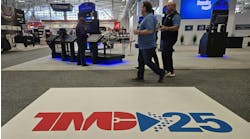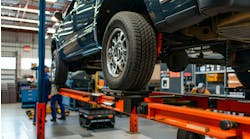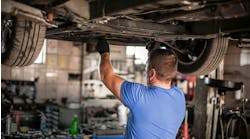Summer may be a hot time for A/C service, but it’s not the only time vehicle aftermarket shops can make money on this type of repair. HVAC systems are a fixture of most vehicles on the road today, and they can be a great revenue generator. So it is important that shop owners stay up-to-date on newly available tools and equipment in the world of A/C, as well as the current regulations pertaining to this service category.
“The rapid expansion of 1234yf in new vehicles, the cost of the new refrigerant and high-voltage compressors in electric and hybrid vehicles will impact how technicians service AC systems in the near future,” says Justin Fisette of Bosch Automotive Service Solutions.
Marion Posen, VP Member Relations and Marketing Mobile Air Conditioning Society Worldwide (MACS) adds that starting January 1, 2018 the sale of most refrigerants will be restricted to 608 and 609-certified technicians. This means distributors must keep refrigerant sales records and verify purchasers are (or employ) 608-609-certified technicians.
A little leg-work up front can set automotive repair professionals on the road to offering this much sought after fix. Fisette says shops will need to invest in a new machine and manual oil injectors, to start. After that, he recommends technicians take a Section 609 refresher course from MACS to fully understand the differences and service needs for a 134a versus 1234yf system.
“The 1234yf service also takes longer than 134a systems, so shops and techs should be aware of the extended time needed to service vehicles when scheduling service and communicating to customers,’ says Fisette.
In addition to regulatory updates, A/C tool and equipment brands, like Robinair, are offering products that can “sniff out” and pinpoint the tiniest of leaks (leak detectors), and also avoid cross-contamination between refrigerants and systems (refrigerant identifiers).
Fisette says that many of today’s A/C machines have fully automatic operation and can be programmed to recover, test and recharge systems while a technician is working on another part of the vehicle or another vehicle altogether. This allows for more billable hours while the service is being performed.
The rise of electric, electric hybrid and plug-in vehicles are also likely to impact A/C service down the road.
Says Fisette: “High-voltage AC systems use a different oil than 12V systems, requiring the use of a separate machine to avoid cross-contamination of the different oils. High-voltage systems use POE ester oil, which is non-conductive. Cross-contamination of PAG and POE oils can damage a high-voltage compressor or compromise the system’s safety.
“Technicians will need to familiarize themselves with high-voltage systems and compressors, which might require additional training or retaking a Section 609 certification class that has been updated with new standards and info for the changes in AC systems.”
If you don’t currently offer A/C service to your customers, now might be a good time to reconsider, as adding A/C system service and repair to your shop will increase revenue and complement other services you already provide.



